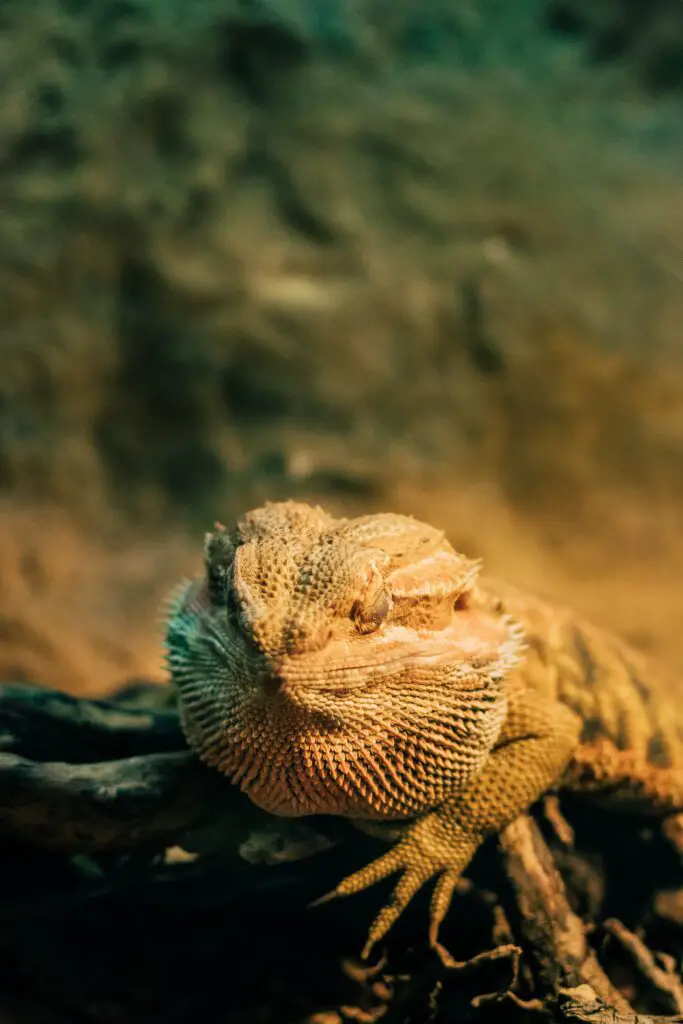Bearded dragon bloated
Is your bearded dragon bloated? Bloating in bearded dragons is a condition characterized by the abnormal swelling or distension of their abdomen. It is an issue that can affect the overall health and well-being of these beloved pet reptiles. As responsible owners, it is crucial to understand the causes, symptoms, and potential consequences of bloating in order to provide prompt and appropriate care.
Definition of Bloating in Bearded Dragons
Bloating refers to the abnormal accumulation of gas or fluid within the gastrointestinal tract of bearded dragons, resulting in an enlarged or distended abdomen. This condition can range from mild discomfort to severe complications if not addressed promptly. The bloating can be caused by various factors such as overeating, improper diet, impaction, or even parasitic infections.
The Importance of Recognizing and Addressing Bloating in Pet Reptiles
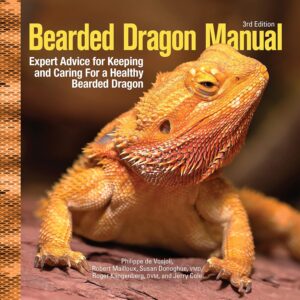 Recognizing and addressing bloating is crucial for maintaining the overall health and longevity of our beloved bearded dragons. Bloating can interfere with their normal bodily functions and lead to discomfort, pain, digestive complications, and even organ damage if left untreated. Moreover, as reptile enthusiasts who have taken up the rewarding responsibility of caring for these incredible creatures, it becomes our moral obligation to ensure their well-being.
Recognizing and addressing bloating is crucial for maintaining the overall health and longevity of our beloved bearded dragons. Bloating can interfere with their normal bodily functions and lead to discomfort, pain, digestive complications, and even organ damage if left untreated. Moreover, as reptile enthusiasts who have taken up the rewarding responsibility of caring for these incredible creatures, it becomes our moral obligation to ensure their well-being.
By promptly identifying signs of bloating and seeking appropriate veterinary assistance when necessary, we demonstrate our commitment to providing a high standard of care for our scaly companions. In this comprehensive article on bloating in bearded dragons, we will delve into various aspects related to this condition: understanding their digestive system intricacies; exploring its potential causes such as improper diet choices; discussing symptoms that indicate bloating; outlining effective treatment options; as well as providing valuable advice on prevention strategies.
Understanding the Digestive System of Bearded Dragons
Overview of the bearded dragon’s digestive system
In order to comprehend bloating in bearded dragons, it is essential to grasp the intricacies of their digestive system. Bearded dragons possess a remarkable digestive tract that enables them to efficiently process and absorb nutrients from their diet. Their digestive system consists of several organs working in harmony to break down food and extract vital sustenance.
At the forefront of this process is the stomach, a muscular organ responsible for storing and breaking down ingested food into smaller particles. From there, the partially digested food proceeds into the intestines.
The small intestine plays a pivotal role in nutrient absorption, where essential proteins, carbohydrates, and fats are extracted and transported into the bloodstream for distribution throughout the reptile’s body. Subsequently, undigested material enters the large intestine or colon for further processing before elimination.
Role of different organs in digestion
The stomach serves as an initial site for mechanical digestion through rhythmic contractions called peristalsis. It also secretes gastric acid and enzymes that aid in breaking down proteins present in the diet. Once broken down into smaller fragments, these proteins can be more readily processed by other organs within their digestive system.
Moving further along is where nutrient absorption primarily occurs. The small intestine plays an integral role in this crucial process by utilizing specialized structures such as microvilli and villi to increase its surface area for efficient absorption.
These finger-like projections enable maximum contact between digested nutrients and absorptive cells lining the intestinal walls. Following nutrient extraction within the small intestine, undigested remnants continue their journey into the large intestine or colon.
Here, water reabsorption takes place along with some additional fermentation through bacterial action on indigestible fiber present in their diet. This final stage prepares waste material for elimination through the cloaca, an opening shared by their digestive, urinary, and reproductive systems.
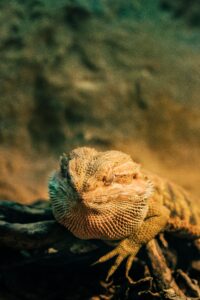
How food is broken down and nutrients are absorbed
Bearded dragon bloated: The process of breaking down food in bearded dragons begins with chewing and saliva production. Rather than having teeth to chew their food, these reptiles possess a specialized jaw structure that aids in grinding and pulverizing prey items before swallowing.
Saliva helps lubricate the food bolus and contains enzymes that initiate the breakdown of carbohydrates. Once swallowed, the food travels to the stomach where gastric acid and enzymes further break it down into smaller components.
Proteins are primarily digested within this acidic environment. Following partial digestion in the stomach, chyme (partially digested material) enters the small intestine where nutrient absorption occurs.
The small intestine’s absorption process involves specific transport mechanisms that allow nutrients to move from inside the intestine into blood vessels lining its walls. These absorbed nutrients then enter circulation for delivery to various tissues within their body.
Understanding how a bearded dragon’s digestive system functions provides valuable insights into how bloating can occur when something disrupts this intricate balance. By appreciating their unique anatomy and physiological processes involved in digestion, we can better comprehend the causes and potential treatments for bloating episodes in these captivating reptiles.
Causes of Bloating in Bearded Dragons
Overfeeding or improper diet
When it comes to bearded dragons, overfeeding is a common mistake that can lead to bloating. These reptiles have a voracious appetite, but their bodies have limits too.
Feeding them excessively or providing an unbalanced diet can cause digestive issues and bloating. It’s essential for owners to understand that bearded dragons need a variety of food items to meet their nutritional requirements.
While insects like crickets and mealworms are popular choices, they should be complemented with leafy greens and vegetables rich in vitamins and minerals. Moreover, portion sizes must be appropriate for the size and age of the dragon to prevent overeating.
Impaction or blockage in the digestive tract
Impaction is another potential cause of bloating in bearded dragons. These curious creatures may ingest foreign objects such as small rocks, sand, or loose substrate material found within their enclosure. These non-digestible substances can create blockages within the digestive tract, hindering normal bowel movements and causing discomfort.
If left untreated, impaction can lead to serious consequences such as intestinal rupture or infection. Symptoms of impaction include decreased appetite, lethargy, constipation, and straining during defecation.
Parasitic infections and gut flora imbalance
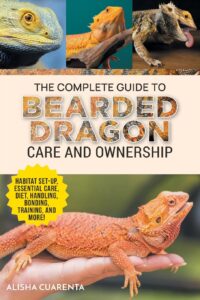 Bearded dragon bloated: Parasitic infections are a significant concern for bearded dragon health as they can disrupt their digestive system leading to bloating. Common parasites that affect these reptiles include pinworms, coccidia, and flagellates. They latch onto the intestinal walls and interfere with nutrient absorption while causing inflammation.
Bearded dragon bloated: Parasitic infections are a significant concern for bearded dragon health as they can disrupt their digestive system leading to bloating. Common parasites that affect these reptiles include pinworms, coccidia, and flagellates. They latch onto the intestinal walls and interfere with nutrient absorption while causing inflammation.
Additionally, an imbalance in gut flora can contribute to bloating as it affects the overall digestion process. Beneficial bacteria play a vital role in breaking down food particles; any disruption in their population can lead to fermentation and gas accumulation within the intestinal tract.
Recognizing Symptoms of Bloating in Bearded Dragons
Physical signs to look out for
To identify bloating in bearded dragons, it is crucial to observe for physical signs. A distended or swollen abdomen is one of the most apparent indications that something may be wrong with their digestion.
Additionally, a loss of appetite or refusal to eat can signal discomfort caused by bloating. Lethargy, where the dragon displays reduced activity levels compared to usual, is another symptom that should not be overlooked.
Behavioral changes that may indicate bloating or discomfort
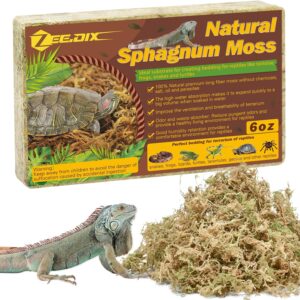 In addition to physical symptoms, behavioral changes can also provide valuable insight into a bearded dragon’s digestive health. If your pet appears restless and continuously paces within its enclosure or shows signs of discomfort such as arching its back or rubbing its belly against surfaces, it may be experiencing bloating. Constant scratching at the abdomen could indicate itching caused by parasites as well.
In addition to physical symptoms, behavioral changes can also provide valuable insight into a bearded dragon’s digestive health. If your pet appears restless and continuously paces within its enclosure or shows signs of discomfort such as arching its back or rubbing its belly against surfaces, it may be experiencing bloating. Constant scratching at the abdomen could indicate itching caused by parasites as well.
Treatment Options for Bearded Dragon Bloating
Adjusting diet and feeding habits
A crucial step in treating bloating is reassessing and adjusting the diet and feeding habits of your bearded dragon. Ensure they receive a balanced diet that includes appropriate portions of protein-rich insects, leafy greens, vegetables, and occasional fruits. Adequate supplementation with calcium and other essential vitamins should not be neglected either.
Assisting with impaction or blockage
If impaction is suspected as the cause of bloating, prompt action must be taken. Providing regular warm baths can help stimulate bowel movements and potentially aid in passing obstructions naturally. In severe cases where impaction persists or causes distress for an extended period, consulting a reptile veterinarian for further examination and possible intervention, such as manual removal, may be necessary.
To sum up bearded dragon bloated
Ensuring the digestive health of bearded dragons is of utmost importance for their overall well-being. By understanding the causes of bloating, such as overfeeding, impaction, and parasitic infections, owners can take preventive measures to avoid these issues. Recognizing physical signs like a distended abdomen and behavioral changes like restlessness will enable prompt intervention.
Adjusting diet and feeding habits alongside seeking veterinary assistance for severe cases can significantly improve the condition of bloated bearded dragons. With proper care and attention to their unique needs, these remarkable reptiles can enjoy a healthy and vibrant life.
Further Reading:
- Carolina Custom Cages Terrarium Review
- 8 Best Basking Rocks for Beardie: What Is the Best Choice?
- 10 Best Thermometers for Beardie: How to Choose the Best One?
- 5 Best Beardie Lighting Setups for Beardie Lovers
- 9 Best Heat Lamps for Beardie: Natural Habitat Provided

